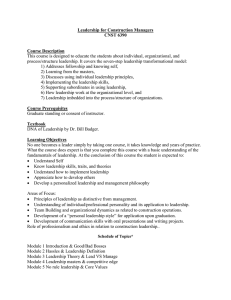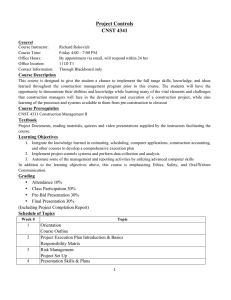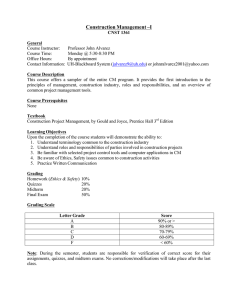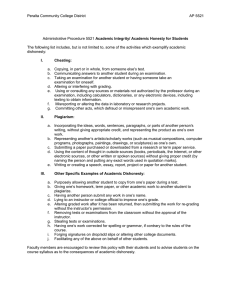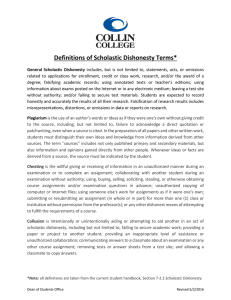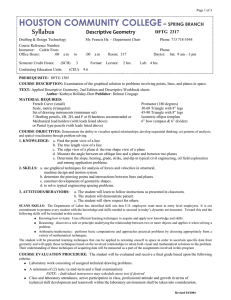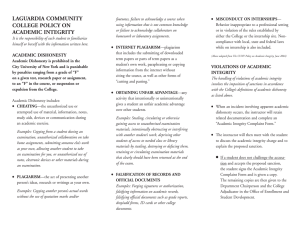Construction Documents for Capital Projects CNST 2345 GENERAL Course Instructor:
advertisement
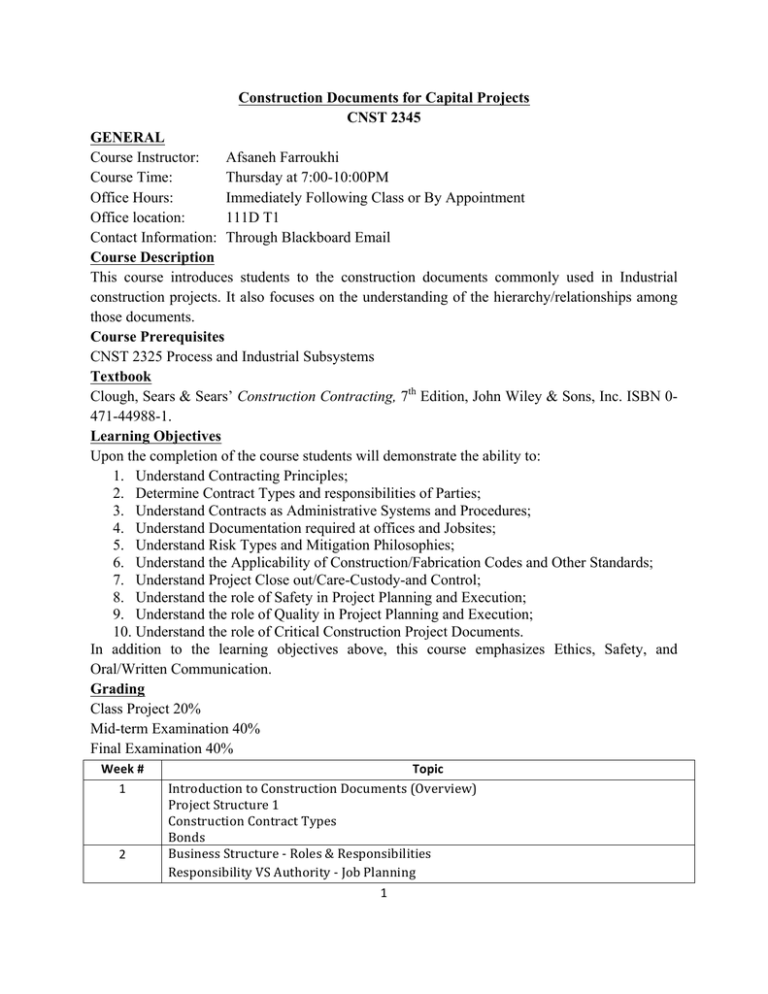
Construction Documents for Capital Projects CNST 2345 GENERAL Course Instructor: Afsaneh Farroukhi Course Time: Thursday at 7:00-10:00PM Office Hours: Immediately Following Class or By Appointment Office location: 111D T1 Contact Information: Through Blackboard Email Course Description This course introduces students to the construction documents commonly used in Industrial construction projects. It also focuses on the understanding of the hierarchy/relationships among those documents. Course Prerequisites CNST 2325 Process and Industrial Subsystems Textbook Clough, Sears & Sears’ Construction Contracting, 7th Edition, John Wiley & Sons, Inc. ISBN 0471-44988-1. Learning Objectives Upon the completion of the course students will demonstrate the ability to: 1. Understand Contracting Principles; 2. Determine Contract Types and responsibilities of Parties; 3. Understand Contracts as Administrative Systems and Procedures; 4. Understand Documentation required at offices and Jobsites; 5. Understand Risk Types and Mitigation Philosophies; 6. Understand the Applicability of Construction/Fabrication Codes and Other Standards; 7. Understand Project Close out/Care-Custody-and Control; 8. Understand the role of Safety in Project Planning and Execution; 9. Understand the role of Quality in Project Planning and Execution; 10. Understand the role of Critical Construction Project Documents. In addition to the learning objectives above, this course emphasizes Ethics, Safety, and Oral/Written Communication. Grading Class Project 20% Mid-term Examination 40% Final Examination 40% Week # 1 2 Topic Introduction to Construction Documents (Overview) Project Structure 1 Construction Contract Types Bonds Business Structure -­‐ Roles & Responsibilities Responsibility VS Authority -­‐ Job Planning 1 3 4 5 6 7 8 9 10 11 12 13 Engineering/Design Responsibility/Liability Spearin Doctrine Specifications Codes and Other Standards Estimating Bidding Job Walk Costs Construction Contracts, Contract Documents Liquidated Damages, Extension/Acceleration Performance & Payment Bonds, Miller Act Bonding Alternatives, Builder's Risk Liability Insurance, Worker's Compensation Mid-­‐Term Examination (Chapters 1 thru 8) Financial/Accounting, Depreciation Payments, Cash Flow Roles and Responsibilities -­‐ Quality Assurance/Quality Control Claims BREAK -­‐ Arbitration/Mediation Planning & Execution, CPM Precedence Diagram, Critical Path, Schedule Float Labor Costs, Equipment Costs Labor Relations Acts, National Labor Relations Board Hiring, Disputes, Labor Laws History of Unions, Role of Unions; Bargaining, Wages Open Shop, Closed Shop Project Safety Requirements, O.S.H.A. Safety Statistics, Safety Reporting Academic Honesty The instructor places all grades into the hands of the student, and the final grade is based solely on the performance of the student on mid-term and final examinations and the class project. Responsibility for attendance and participation is the responsibility of the student. Students who violate University rules on scholastic dishonesty are subject to disciplinary penalties, including the possible failure of the course and dismissal from the University. Since dishonesty harms the individual, all students, and the integrity of the University, policies on scholastic dishonesty will be strictly enforced. Students with Disabilities University of Houston provides, upon request, appropriate academic adjustments for qualified students with disabilities. Any student with a documented disability (physical or cognitive) who requires accommodations should contact the Center for Students with Disabilities (713/7435400) for assistance. 2 Examination Policy Exams will include material covered in the class room discussions, homework, and materials posted to Blackboard as well as specified chapters of the text. Exam make-ups will only be allowed in the event of a verifiable emergency situation which must be documented to the instructor’s satisfaction. Graded work assignments submitted after the stated submission date and time shall be reduced in possible grade by 20%. The student is responsible for all reading assignments and class handouts whether or not covered in class. Class Project The class project – a Construction Project Proposal, in response to a RFP provided by the instructor, is valued as 20% of the student’s grade, and must be received by the posted date in order to receive the highest possible grade. No projects will be accepted after the stated due date. Phones and other Electronic Devices Phones and other Electronic Devices are not to be heard. Make sure you silence these devices during class. Any device that emits noise during class is a distraction and is inappropriate for the classroom. Talking / texting on your phone during class is not allowed. It is not considerate to your fellow classmates who have paid for the course. All electronic devices must be turned off and out of sight during exams and quizzes. Students may be asked to leave for the day if this behavior persists. Academic evaluations during classes missed under this criteria will be counted as zero. Changes in the Syllabus: The instructor reserves the right to make changes to the syllabus. Changes will be announced in class. 3
